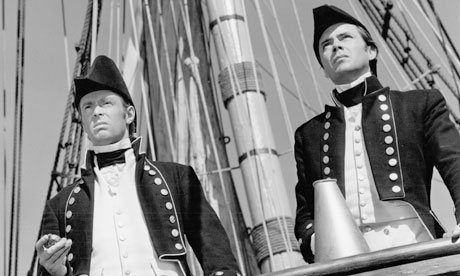
Richard Carpenter, who has died of a blood clot aged 82, brought intelligent, imaginative entertainment to generations of young television viewers through the fantasy series he created. After almost two decades as an actor, he found his first success as a writer with Catweazle (1970-71), starring Geoffrey Bayldon as a dishevelled, eccentric, 11th-century magician transported to the 20th century. Comic misunderstandings were mixed with slapstick as Catweazle befriended a farmer's son, Carrot (played by Robin Davies), who unravelled for him modern-day mysteries such as "electrickery" and the "telling-bone".
In the second series, Carpenter had Catweazle searching for symbols of the 13 signs of the Magic Zodiac and being taken in by another boy, Cedric (Gary Warren), at his parents' country estate. "I've always been interested in the person who is outside society," said Carpenter in a 1990 interview with the magazine Time Screen. "In a sense, that is the hero – the heroic figure is the man who takes on the world alone."
Although Catweazle won the 1971 Writers' Guild award for best children's drama script, the new management at LWT did not commission a further series. However, Carpenter was made the lead writer on another of the company's Sunday-teatime series, The Adventures of Black Beauty (1972-74), which took its characters from Anna Sewell's book but owed more to the success of the contemporary ITV equestrian drama Follyfoot. Like Catweazle, it became required family viewing beyond the immediate target audience of children.
Later, Carpenter re-imagined the Robin Hood legend in Robin of Sherwood (1984-86). Mysticism was one of its distinctive ingredients, reflecting a renewed interest in paganism, as well as the concerns of the growing environmental movement and – through the idealism of the hero – a backlash against the materialism of the Thatcher era.
Another decade on, Carpenter adapted The Borrowers (in 1992) and The Return of The Borrowers (in 1993) for the BBC, from Mary Norton's novels about the 6in-high Clock family, forced to face the world outside after fleeing from their home under the floorboards of an English manor house. The scripts, special effects and award-winning production design created a disarmingly believable secret world.
Carpenter was born in King's Lynn, Norfolk, and showed an interest in Greek mythology and Shakespeare as a child. After studying history of art at an art school in Cambridge, he did national service in the army, where he earned the nickname "Kip". He won a scholarship to the Old Vic theatre school, London, and worked with repertory companies across the country; he met the actor Annabelle Lee in Sheffield and they married in 1954.
His first screen appearances were in children's television serials – The Silver Sword (1957), The Lost King (1958) and The Black Arrow (1958), the latter based on Robert Louis Stevenson's novel about the War of the Roses, with Carpenter playing the abbot.
He was soon acting in peak-time series, taking the roles of the writer turned private eye's assistant Peter Parker in the crime drama Knight Errant (1959-60) and Dr Philip Hope in The Citadel (1960-61). There were also dozens of one-off character roles on television and in films such as HMS Defiant (1962).
In 1969, after a year in the West End play Wait Until Dark, Carpenter decided he was tired of acting and submitted his first script idea, Catweazle, to LWT. Its success meant he could leave his previous career behind for good. He was given the chance to create another original series with The Ghosts of Motley Hall (1976-78), about phantoms living in an ancestral home. The idea came from his recollection of seeing a ghost while staying at theatrical digs in Liverpool and the characters conformed to Carpenter's formula of writing about loners – in this case, those "out of the mainstream existence", as he described it.
While making The Adventures of Black Beauty, Carpenter formed a friendship with its producer, Sidney Cole, and executive producer, Paul Knight. The three established their own production company, Gatetarn, and made drama series about English folk legends. Dick Turpin (1979-82), starring Richard O'Sullivan as the highway robber, was followed by Smuggler (1981), with Oliver Tobias playing an unjustly disgraced 19th-century naval lieutenant, and its sequel, Adventurer (1987). The trio found their greatest success with Robin of Sherwood, starring Michael Praed and then Jason Connery.
Carpenter also contributed scripts to Enid Blyton's Famous Five (1978-79), the animated series Doctor Snuggles (1981), The Baker Street Boys (1983), Pulaski (1987), Hannay (1989) and The Scarlet Pimpernel (1999). On completing The Borrowers, which won a Bafta for best children's programme, he told the magazine TV Zone: "I'd rather write adult programmes for children than childish programmes for adults."
Carpenter received a second Writers' Guild award, for Out of Sight (1996-98), a children's comedy he created about an invisible schoolboy. His final script for television, I Was a Rat (2001), was a three-part adventure based on Philip Pullman's fantasy novel. Carpenter, who wrote novelisations of many of his television programmes, also received a Children's Bafta award in 2000.
He is survived by Annabelle and their children, Tom and Harriet.
• Richard Michael Carpenter, writer, producer and actor, born 14 August 1929; died 26 February 2012

